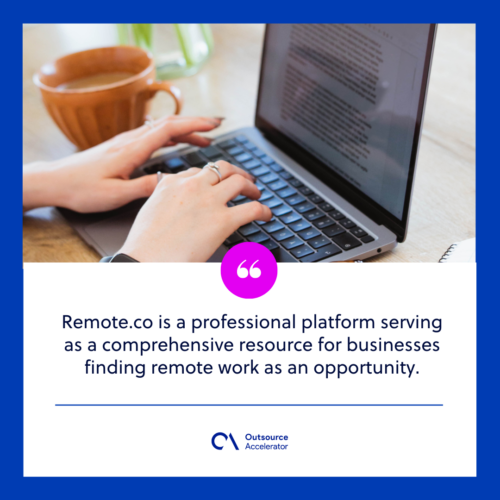Explore Resources and Tools for Remote Professionals
Explore Resources and Tools for Remote Professionals
Blog Article
Exactly How to Build an Effective Team of Remote Professionals
In today's increasingly electronic landscape, the capacity to build a successful group of remote professionals is important for organizations intending to prosper. It is the subtler facets-- like nurturing a cohesive business culture and promoting continual learning-- that can genuinely establish a remote group apart.
Specify Clear Objectives and Expectations
Regularly developing clear objectives and assumptions is vital for the success of a remote team (Remote Professionals). Without these elements, group members may experience confusion regarding their duties, obligations, and the general goals of the job. This ambiguity can lead to decreased productivity, misaligned initiatives, and eventually, job failure
To specify clear objectives, it is essential to employ the SMART criteria-- Particular, Quantifiable, Possible, Appropriate, and Time-bound. This technique makes certain that each goal is distinct and can be properly connected to all team participants. Additionally, it is necessary to straighten specific goals with the overarching vision of the organization, promoting a sense of objective and commitment amongst employee.

Foster Effective Interaction

Normal check-ins and group meetings can aid preserve a strong communication flow, permitting members to share progression updates and review any kind of obstructions they might experience. It is also vital to acknowledge that various individuals might have differing communication styles. Recognizing and suiting these distinctions can lead to more purposeful communications and an extra natural team dynamic.
In addition, clarity is necessary in all types of interaction, whether written or verbal. When needed, urge group participants to express their concepts succinctly and to seek clarification. This technique makes sure and decreases misunderstandings that everybody gets on the very same web page. By prioritizing effective communication, remote teams can enhance efficiency, strengthen relationships, and create a more inclusive workplace, inevitably bring about better success in achieving usual objectives.

Utilize the Right Devices
To sustain effective interaction within a remote team, it is very important to utilize the right devices that assist in collaboration and enhance workflows. The option of tools can dramatically impact performance, ensuring that staff member stay linked and engaged in spite of geographical distances.
Begin by carrying out project administration software application, such as Trello or Asana, to arrange tasks, set due dates, and track development. This promotes accountability and offers exposure right into each member's payments. Additionally, interaction platforms like Slack or this contact form Microsoft Teams provide immediate messaging abilities, making it possible for real-time conversations and fast decision-making.
Video conferencing tools, such as Zoom or Google Meet, are crucial for face-to-face communications, which aid construct rapport and reinforce connections amongst employee. Furthermore, file sharing and storage space solutions like Google Drive or Dropbox ensure that essential data are obtainable and editable by all staff member, promoting partnership on jobs.
Including these tools efficiently creates an environment where remote professionals can thrive. By picking the best technology, organizations can boost interaction, improve job management, and ultimately attain their objectives a lot more successfully.
Build a Solid Firm Culture
Developing a solid company society within a remote team is essential for fostering engagement and commitment among staff members. A well-defined society supplies a feeling of belonging and shared purpose, which is critical when employee are distributed across numerous places. To grow this culture, leaders need link to develop clear values and assumptions that resonate with staff members, guaranteeing that every person understands the mission and vision of the organization.
Normal communication is crucial in reinforcing this society. Making use of video phone calls, group meetings, and casual check-ins can assist preserve links and promote openness. In addition, commemorating accomplishments, both large and small, enhances a society of acknowledgment and gratitude.
Motivating group cooperation with digital platforms not only improves efficiency but likewise promotes social relationships - Remote Professionals. Organizing virtual team-building tasks can even more reinforce bonds amongst group members, making them feel much more integrated into the company
Finally, it is essential to pay attention to staff member comments and adapt as needed. By revealing that their voices issue, leaders can develop depend on and loyalty, ultimately creating a prospering remote job atmosphere where workers feel valued and involved.
Motivate Constant Understanding and Growth
A solid business society prepares for motivating continual understanding and read the full info here growth within a remote team. By fostering an environment that values growth, companies can encourage employees to improve their skills, adapt to brand-new obstacles, and eventually contribute better to group goals.
To promote continuous understanding, think about executing regular training sessions, workshops, and webinars that align with both specific occupation goals and organizational requirements. Utilize modern technology to assist in access to e-learning platforms, making sure that resources are conveniently offered for remote team participants.
Urge understanding sharing by establishing mentorship programs and developing online forums for staff members to trade understandings and ideal techniques. Awarding and recognizing employee that actively take part in finding out efforts enhances the value of development and inspires others to follow suit.
In addition, carrying out normal comments sessions can aid determine skill voids and areas for renovation, allowing for customized development strategies. By focusing on continuous discovering and development, remote teams can grow a culture of resilience, versatility, and technology, which are vital for browsing the intricacies of today's organization landscape.
Conclusion
Finally, the facility of an effective remote team depends upon the assimilation of clear objectives, reliable communication, suitable tools, a durable firm culture, and constant discovering possibilities. By aligning private contributions with organizational objectives and fostering an environment of openness and collaboration, remote experts can thrive. Remote Professionals. The application of these approaches not just enhances team cohesion yet also drives inspiration, inevitably resulting in enhanced performance and success in a remote working landscape
It is the subtler facets-- like nurturing a cohesive firm culture and promoting continual understanding-- that can absolutely establish a remote group apart.Effective communication is the cornerstone of a flourishing remote team. By focusing on efficient communication, remote groups can improve productivity, reinforce relationships, and develop an extra comprehensive job environment, inevitably leading to higher success in attaining usual objectives.
Developing a solid firm culture within a remote group is necessary for cultivating engagement and commitment among staff members.In conclusion, the establishment of a successful remote team hinges on the combination of clear objectives, effective communication, proper tools, a durable company society, and continuous learning chances.
Report this page